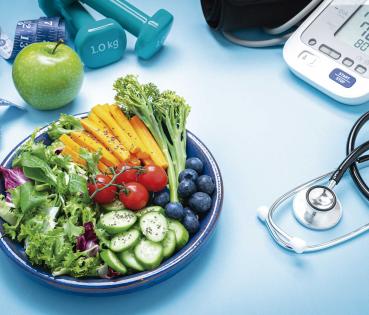
What foods can help lower cholesterol?
We are used to hearing that cholesterol is bad for you. Today we will examine what blood cholesterol levels depend on and how to adapt your diet to make it healthier for your heart.
Cholesterol is a crucial lipid that is needed to build the cell membranes of all animals, including humans. It is a molecule involved in a number of roles that enable the body to function properly. For example, cholesterol is involved in the production of certain hormones and in the absorption of vitamin D. Our body is capable of manufacturing it (endogenous cholesterol). However, we also obtain it by eating animal-based foods (exogenous cholesterol).
Types of cholesterol
Having high cholesterol, or hypercholesterolaemia, can increase the risk of heart conditions. It has been linked to the creation of atheroma plaques in the arteries, which can hinder or even block blood flow. As a result, this can lead to a heart attack or a stroke.
Three parameters related to cholesterol are included in blood tests:
- LDL cholesterol. This type of cholesterol travels in the bloodstream bound to LDL lipoproteins. If there is too much LDL cholesterol circulating, it can build up on the artery walls.
- HDL cholesterol. This type of cholesterol binds to higher density HDL lipoproteins. It helps to remove cholesterol molecules that are already attached to blood vessels and transport them to the liver. High levels of this type of cholesterol are associated with lower cardiovascular risk.
- Total cholesterol. This refers to the total circulating cholesterol in blood regardless of which type of lipoprotein it is attached to.
How can you lower your cholesterol by changing your diet?
Healthy habits can help lower cholesterol levels, including following a diet that includes cholesterol-lowering foods. For example:
- Legumes, and particularly, soybeans.
- Foods rich in soluble dietary fibre: oats, onions, apples, bananas, carrots, pumpkin, beetroot, etc.
- Olive oil, for its oleic acid content.
- Foods rich in omega-3: fish such as sardines or mackerel, nuts, flaxseed, etc.
The recommended diet for people with high cholesterol should be built around fresh plant-based foods, such as greens, fruit and vegetables. It should also include the consumption of legumes, whole-grain cereals, nuts and seeds. On the other hand, intake of the following foods and beverages should be limited:
- Foods rich in trans fats: industrially produced pastry, margarine, salty snacks, ultra processed foods, etc.
- Beverages and other products with added sugar, such as sweets, soft drinks, dairy products with high sugar content, etc.
- Sausages and other processed meats.
- Refined cereals (made with white flour).
- Alcoholic beverages.
Dietary recommendations aimed at lowering cholesterol strive to reduce cardiovascular risk. Furthermore, physical activity, good sleep habits and proper stress management are other examples of habits that should be acquired.
It should be emphasised that the absorption of exogenous cholesterol can vary greatly between individuals, as it also depends on genetic factors. Moreover, some forms of hypercholesterolaemia are primarily a result of overproduction of endogenous cholesterol and not a consequence of food intake.




